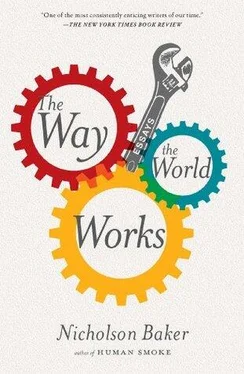This various reading, which I now conducted with discretion, was digested, according to the precept and model of Mr. Locke, into a large commonplace-book; a practice, however, which I do not strenuously recommend. The action of the pen will doubtless imprint an idea on the mind as well as the paper; but I much question whether the benefits of this laborious method are adequate to the waste of time; and I must agree with Dr. Johnson (Idler, No. 74), ‘that what is twice read is commonly better remembered than what is transcribed.’
But that’s not true, is it? Gibbon couldn’t have formed his style — that unique window display of teacups and sarcophagi — without having felt his way, word by word, at the artificially impeded speed of handwriting, through some of the poetry of Gray and Pope, for instance. Probably he remembered Johnson’s Idler essay because he had once been moved to commonplace it himself.
To commonplace —is it a legal verb? It is, according to Samuel Johnson:
Commonplace-book
A book in which things to be remembered are ranged under general heads.
I turned to my common-place book and found his case under the word coquette. Tatler .
To Commonplace
To reduce to general heads.
I do not apprehend any difficulty in commonplacing an universal history. Felton .
“Felton” turns out to be one Henry Felton, D.D., who in A Dissertation on the Classics (1710) wasn’t sure that the activity of reducing to general heads was always beneficial:
Common-Placing the Sense of an Author, is such a stupid Undertaking, that, if I may be indulged in saying it, they want common Sense that practise it. What Heaps of this Rubbish have I seen! O the Pains and Labour to record what other People have said, that is taken by those, who have nothing to say themselves!. . When I see a beautiful Building of exact Order and Proportion, taken down, and the different Materials laid together by themselves, it putteth me in mind of these Common-Place Men .
Felton may be right — you don’t want to take it too far. Charles Reade, the nineteenth-century novelist, had so many commonplace books that “they completely filled one of the rooms in his house,” according to Richard Le Gallienne. He devoted one full day out of each week “cataloguing the notes of his multifarious reading.” Still, it worked for him. The big risk, if you accumulate a lot of chirographic bits and pieces, is that you will be tempted to quote more of them than you should. In a review of a book called The Progress of the Intellect, George Eliot criticizes the author (Robert William Mackay) for writing pages that “read like extracts from his common-place book, which must be, as Southey said of his own, an urn under the arm of a river-god, rather than like a digested result of study, intended to inform the general reader.” Don’t feel you must recirculate everything that you have found (so I tell myself); a recopied passage will urn its keep even if you never quote it anywhere.
There is good to be gained in signing someone else’s mind-signature, in scribbling in tongues: the retracing of a series of long-lost authorial motions with your own present pen, if you do it in the proper spirit, out of a desire to stay delight’s presence rather than out of autodidactic obligation, or even if you begin reluctantly, dutifully, troubled by feelings of self-pelf in the face of so many pressing university-press editions, can calm and steady your state, not to mention improve it, for while the transcribing may appear to be a form of close and exclusive concentration, it has an equally important element of peaceable meditative mindlessness as well, like playing with a paper clip. Reading is fast, but handwriting is slow — it retards thought’s due process, it consumes irreplaceable scupperfuls of time, it pushes every competing utterance away — and that is its great virtue, in fact, over mere underlining, and even over an efficient laptop retyping of the passage: for in those secret interclausal tracts of cleared thought-space, in those extended dreaming blanks of fair-copying between the instant it took the eye to comprehend a writer’s phrase, and the seeming eternity it then takes the hedgehog hand to negotiate that phrase again in legible, physical loops on the notebook page (especially on the verso side of the notebook page, when the spiral binding interferes annoyingly with the muscle of the little finger), during which all of your purplest hopes are compelled to idle, and you must pay attention to some common rhetorical turn that you had never until then deigned to think about, at the same time your constrained prose-aptitude is stimulated to higher rates of metabolism by what Johnson called “the contagion of diligence” and through its temporary forced conformity with another person’s exhaust-system of expression — in this state of rubber-burning, clutch-smoking subservience, new quiet racemes will emerge from among the paving stones and foam greenly up in places they would never otherwise have prospered.
Just don’t do it too much — and always use quotation marks.
(2000)
Preface to A Book of Books, by Abelardo Morell
In the old black-and-white TV series, Superman, when he needed to pass through a wall, would put his palms against it and lean, frowning. Gradually his caped form would merge with the plaster and pass through lath and two-by-fours, and then he would reappear in the next room. It wasn’t as easy as flying, apparently, but it could be done. This became my childhood model of reading. You press your mind, your forehead, against the beginning of a book, the cool cover of it, appreciating its impenetrability. It is rectangular and thick, heavy enough to stop a bullet or press a leaf flat. It will, you think, never let you through. And then you begin to lean into it, applying a little attentive pressure, and the early pages begin to curl back with a soft, radish-slicing sound, and you’re in. You’re in the book. The thick, unitary clumps of chapters fan out into their component pages, and each turned page dematerializes itself, once read, into the fluent, cajoling voice its words carry, and then you’re past the midpoint, and the book stretches out before you and behind you like a string of paper lanterns in a huge shadowy tent. Then you’re almost done, and the pages begin to shrink and solidify once more. When you reach the last sentence, there rests under your left thumb a monolithic clump of paper through which, it seems, you could not possibly have traveled.
What unites all books, as Abelardo Morell is able to document in these magnificent photographs, and what is responsible for a good measure of their appeal, is their inter-dimensional ambiguity. Does the printed page inhabit two dimensions, or three, or four? As we read or look, we pretend that a page is an ideally flat and code-bearing plane, with a measurable height and width but no thickness and no curvature. But a page is almost never flat except when a book is closed; opened, its surface rises up slightly toward the inside margin and then veers south into the binding, like a mounding wave.
And of course each page has thickness. Your fingertips know this perfectly well: they inform you immediately when they have by mistake snagged two corners together, rather than one, in preparation for turning. The embossed letters in a book for the blind cast sharp shadows. Some paper is marvelously thin: the thickest books, the big dictionaries, for instance, whose bindings arch upward into mining tunnels when opened, sometimes have the flimsiest, rattliest pages. And into these towering cliffs of reference the publisher scoops out a series of alphabetic fingerholds as an aid to the word-hunter; crescent-moon notches that then become worn, so Morell’s camera records, as if made of soft sandstone, by the impatient touch of many queries.
Читать дальше












